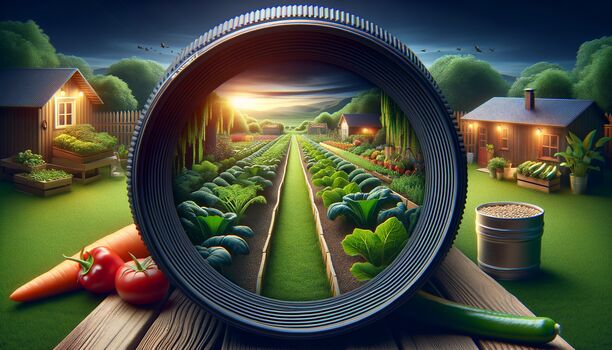


Letztes Update: 14. Januar 2026
Lucy is seeking advice on natural pest control methods for her vegetable garden. She aims to maintain an organic garden and is looking for effective, chemical-free ways to repel pests. Suggestions from the community on sustainable gardening practices are welcomed.
Hi there! I'm Lucy, a passionate gardener who loves to share insights on plant care and sustainable gardening. I've been nurturing my vegetable garden for years, aiming to keep it as organic as possible. However, I've encountered a challenge with pests that seem to enjoy my vegetables as much as I do. I'm reaching out to this amazing community for advice on natural pest control methods. How can I repel these unwanted visitors without resorting to harsh chemicals? I'm particularly interested in tips and tricks that have worked for you in maintaining a healthy, thriving garden using natural means. Any suggestions on how to naturally deter pests and keep my garden flourishing would be greatly appreciated. Thank you in advance for your help!
Last updated 3 mins ago
Antwort der Redaktion
Maintaining a thriving vegetable garden without resorting to harsh chemicals is a rewarding challenge. Natural pest control methods not only protect your plants but also preserve the ecosystem of your garden. Here are some effective strategies to keep those pesky intruders at bay.
Before diving into specific natural pest control techniques, it's crucial to understand your garden's ecosystem. Every garden hosts a variety of insects, some of which are beneficial. Identifying which pests are harmful and which are helpful is the first step in creating a balanced environment. Encourage beneficial insects like ladybugs and lacewings, which naturally prey on common garden pests.
Companion planting is a time-tested method of natural pest control. By strategically planting certain herbs and flowers alongside your vegetables, you can repel pests and attract beneficial insects. For instance, marigolds are known to deter nematodes, while basil can keep flies and mosquitoes away. Experiment with different plant combinations to find what works best for your garden.
Creating your own natural sprays is an effective way to combat pests without chemicals. A simple garlic spray, made by blending garlic cloves with water, can deter a wide range of insects. Similarly, a mixture of water and dish soap can help control aphid populations. Always test your homemade sprays on a small area first to ensure they don't harm your plants.
Neem oil is a popular choice for natural pest control. Derived from the seeds of the neem tree, this oil disrupts the life cycle of many pests without harming beneficial insects. Dilute neem oil with water and apply it to affected plants to keep pests at bay. It's a versatile solution that can be used throughout the growing season.
Attracting natural predators to your garden is a sustainable way to manage pest populations. Birds, frogs, and beneficial insects can significantly reduce the number of harmful pests. Provide habitats such as birdhouses and small ponds to invite these allies into your garden. A diverse ecosystem will naturally regulate itself, reducing the need for intervention.
Consistent garden maintenance is key to preventing pest infestations. Regularly inspect your plants for signs of damage or pest activity. Remove any dead or diseased plants promptly to prevent the spread of pests. Keeping your garden clean and well-maintained will make it less attractive to unwanted visitors.
Embracing natural pest control methods not only protects your vegetable garden but also supports a healthy environment. By understanding your garden's ecosystem, using companion planting, and encouraging natural predators, you can create a thriving, chemical-free garden. Remember, patience and observation are your best tools in maintaining a pest-free garden. Happy gardening!
Last updated 3 mins ago
Creating a garden that thrives naturally is a dream for many. One of the key challenges you might face is dealing with pests without resorting to harsh chemicals. If you're looking for ways to maintain your garden's health and keep pests at bay using natural methods, you're in the right place. Natural pest control is not only better for the environment but also for the plants and those who enjoy them.
One effective strategy is to understand the ecosystem of your garden. By learning about Is garden a place or thing?, you can gain insights into making your garden a less inviting place for pests. This knowledge can help you create a balanced environment where beneficial insects thrive, naturally keeping harmful pests in check.
Another aspect of natural pest control involves the soil. Healthy soil is the foundation of a healthy garden. By exploring What are the key indicators that my soil is healthy and how can I improve its quality over time?, you can learn how to enhance your soil's health naturally. This, in turn, can lead to stronger plants that are more resistant to pests.
Lastly, don't overlook the importance of companion planting and crop rotation. These methods can naturally deter pests and improve your garden's overall health. For more information on how to implement these strategies, check out How do I properly rotate crops in a small garden space to improve yield and soil health?. By following these tips and embracing natural pest control methods, you can enjoy a vibrant, healthy garden without the need for harsh chemicals.